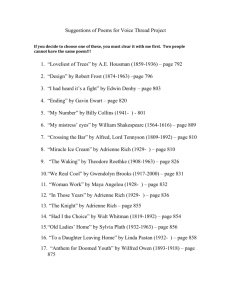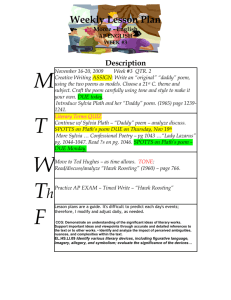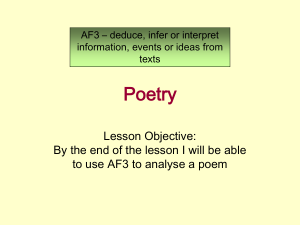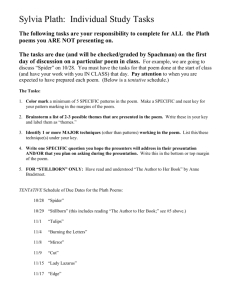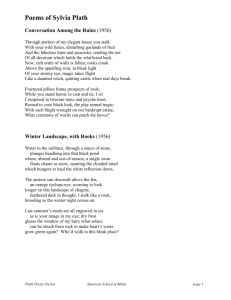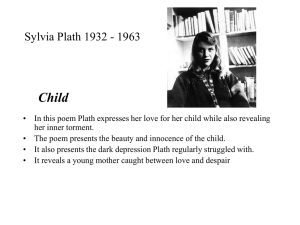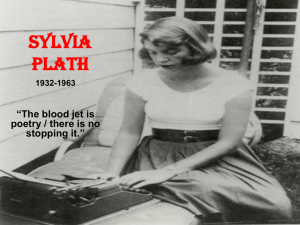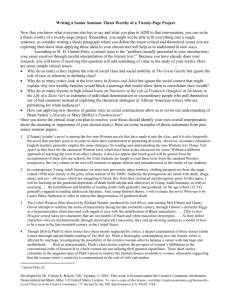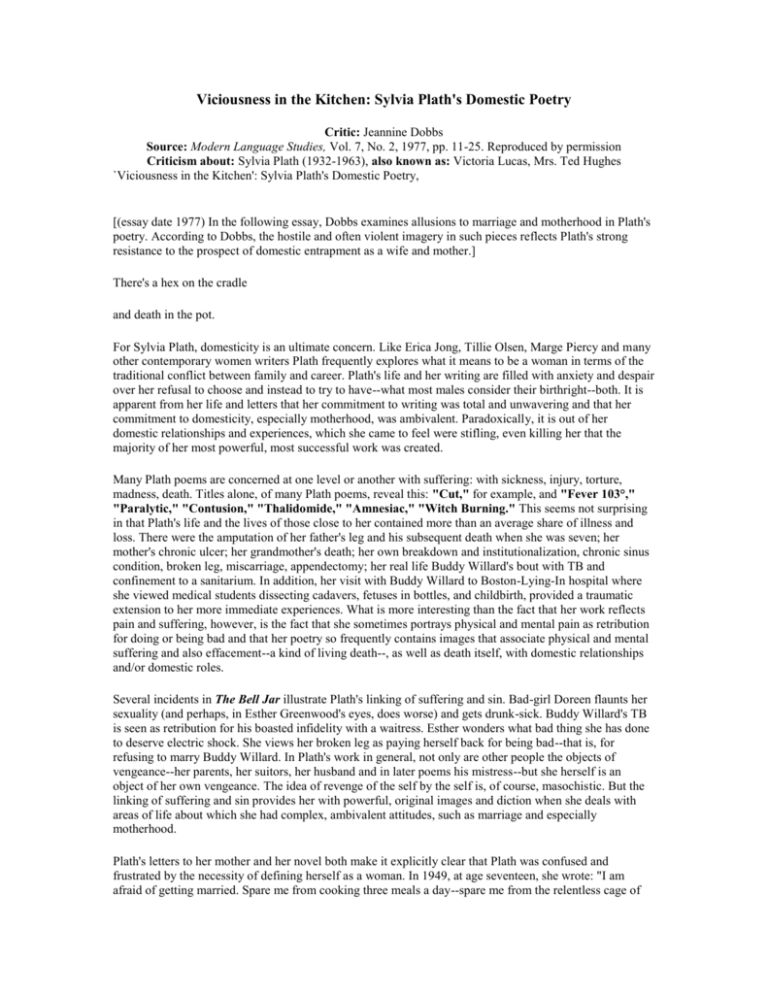
Viciousness in the Kitchen: Sylvia Plath's Domestic Poetry
Critic: Jeannine Dobbs
Source: Modern Language Studies, Vol. 7, No. 2, 1977, pp. 11-25. Reproduced by permission
Criticism about: Sylvia Plath (1932-1963), also known as: Victoria Lucas, Mrs. Ted Hughes
`Viciousness in the Kitchen': Sylvia Plath's Domestic Poetry,
[(essay date 1977) In the following essay, Dobbs examines allusions to marriage and motherhood in Plath's
poetry. According to Dobbs, the hostile and often violent imagery in such pieces reflects Plath's strong
resistance to the prospect of domestic entrapment as a wife and mother.]
There's a hex on the cradle
and death in the pot.
For Sylvia Plath, domesticity is an ultimate concern. Like Erica Jong, Tillie Olsen, Marge Piercy and many
other contemporary women writers Plath frequently explores what it means to be a woman in terms of the
traditional conflict between family and career. Plath's life and her writing are filled with anxiety and despair
over her refusal to choose and instead to try to have--what most males consider their birthright--both. It is
apparent from her life and letters that her commitment to writing was total and unwavering and that her
commitment to domesticity, especially motherhood, was ambivalent. Paradoxically, it is out of her
domestic relationships and experiences, which she came to feel were stifling, even killing her that the
majority of her most powerful, most successful work was created.
Many Plath poems are concerned at one level or another with suffering: with sickness, injury, torture,
madness, death. Titles alone, of many Plath poems, reveal this: "Cut," for example, and "Fever 103°,"
"Paralytic," "Contusion," "Thalidomide," "Amnesiac," "Witch Burning." This seems not surprising
in that Plath's life and the lives of those close to her contained more than an average share of illness and
loss. There were the amputation of her father's leg and his subsequent death when she was seven; her
mother's chronic ulcer; her grandmother's death; her own breakdown and institutionalization, chronic sinus
condition, broken leg, miscarriage, appendectomy; her real life Buddy Willard's bout with TB and
confinement to a sanitarium. In addition, her visit with Buddy Willard to Boston-Lying-In hospital where
she viewed medical students dissecting cadavers, fetuses in bottles, and childbirth, provided a traumatic
extension to her more immediate experiences. What is more interesting than the fact that her work reflects
pain and suffering, however, is the fact that she sometimes portrays physical and mental pain as retribution
for doing or being bad and that her poetry so frequently contains images that associate physical and mental
suffering and also effacement--a kind of living death--, as well as death itself, with domestic relationships
and/or domestic roles.
Several incidents in The Bell Jar illustrate Plath's linking of suffering and sin. Bad-girl Doreen flaunts her
sexuality (and perhaps, in Esther Greenwood's eyes, does worse) and gets drunk-sick. Buddy Willard's TB
is seen as retribution for his boasted infidelity with a waitress. Esther wonders what bad thing she has done
to deserve electric shock. She views her broken leg as paying herself back for being bad--that is, for
refusing to marry Buddy Willard. In Plath's work in general, not only are other people the objects of
vengeance--her parents, her suitors, her husband and in later poems his mistress--but she herself is an
object of her own vengeance. The idea of revenge of the self by the self is, of course, masochistic. But the
linking of suffering and sin provides her with powerful, original images and diction when she deals with
areas of life about which she had complex, ambivalent attitudes, such as marriage and especially
motherhood.
Plath's letters to her mother and her novel both make it explicitly clear that Plath was confused and
frustrated by the necessity of defining herself as a woman. In 1949, at age seventeen, she wrote: "I am
afraid of getting married. Spare me from cooking three meals a day--spare me from the relentless cage of
routine and rote. I want to be free. . . ." She felt "bewildered," two years later, by an extended stint as a
sleep-in nursemaid and spoke of the job as "slavery." "Learning of the limitations of a woman's sphere,"
she wrote, "is no fun at all." And at twenty, a student at Smith, she insisted: "Graduate school and travel
abroad are not going to be stymied by any squealing, breastfed brats." By the time she reached the
University at Cambridge, however, her attitude had changed. She began to see motherhood as a chance for
"extending my experience of life," and to fear that if she did not marry she would become one of "the weird
old women," "the bluestocking grotesques," she saw as alternatives. Shortly before she met Ted Hughes in
Cambridge in the winter of 1956, her letters reveal that she was ripe for marriage: "I don't know how I can
bear to go back to the states unless I am married. . . . I really think I would do anything to stay here."
In The Bell Jar, Esther Greenwood mirrors Plath's ambivalence, alternating between insisting she'll marry
and have a parcel of kids and exclaiming: "If I had a baby to wait on all day, I would go mad." But one of
the ironies of the novel is the fact that the reader knows from the beginning of the book that Esther will
have a baby. Discussing the gifts she received during her month in New York as guest editor of a slick
woman's magazine, she remarks: "I use the lipsticks now and then, and last week I cut the plastic starfish
off the sunglasses for the baby to play with." Society assumes a woman will marry. Esther is besieged by
the influences that propagate the myth that the be-all and end-all of a woman's existence is a husband, a
house, and a handful of kids. After Esther's release from the mental hospital, Buddy's final words to her are:
"I wonder who you'll marry now . . . you've been here." Not to marry and give up other aspirations and be
content, is to go against society's expectations, to be bad, to commit a kind of sin.
Writing to her mother from Smith, Plath agonized over "which to choose?"--meaning, work or pleasure?
career or marriage? The central metaphor of The Bell Jar, the fig tree, is Plath's literary portrayal of this
dilemma. Each fig represents an option, a future: to be a famous poet, an editor or the like, or to be a wife
and mother. Each is mutually exclusive and only one can be picked. As Esther (very much an extension of
her creator here) hesitates, debating with herself, "the figs began to wrinkle and go black, and, one by one,
they plopped to the ground at her feet." Rejection of any option was difficult because something in her
wanted it all. "I'll be flying back and forth between one mutually exclusive thing and another for the rest of
my days," Esther says. In her own life, Plath tried for the compromise. There were times, her letters and the
remembrances of her family and friends reveal, that domestic life alone seemed to fulfill her. She was a
perfectionist at housekeeping as she had always been at her college work and at writing. At times she
reveled in being "cowlike" and maternal. Then, writing pot-boilers for "soppy women's magazines and
cooking and sewing" were her highest ambitions. At times, too, she felt that "children seem[ed] an impetus
to [her serious] writing." But a resentment against them, against their demands on her time, their drain on
her creativity, is evident too. Pleasure, resentment, guilt. Ambivalence. Plath's work suggests that the
attempt to resolve these feelings failed. Her suicide may have been, to some degree, a final acting out of her
belief in punishment, vengeance, of the self on the self, for this failure.
Plath's use of images and diction depicting suffering in relationship to female roles and domestic
experience expressed in The Bell Jar and her late poetry are foreshadowed in several poems in her first
book of poetry, The Colossus (1960). Many of the poems in this volume were written after her marriage;
some were written during her first pregnancy. (Her daughter was born in April of 1960). Poems in The
Colossus that deal with male/female relationships or motherhood are primarily dark, fearful poems.
"The Manor Garden," the initial poem in The Colossus, was written in the fall of 1959. It begins by
creating an apprehensive, foreboding tone that dominates the poem: "The fountains are dry and the roses
over. / Incense of death. Your day approaches." Here are death in the midst of birth; the external, natural
world at odds with the internal, human one. Only momentarily does a correspondence, a harmony, occur
between the natural and the maternal: "The pears fatten like little buddhas" as the fetus evolves and the
womb fills. But negative images (wolves and hard stars, a spider and worms) outweigh the positive ones
(pears, fishes, a bee's wing, heather). The poem's prophecy is for "a difficult borning."
Not apprehension but real revulsion to motherhood is expressed in "Sow." Written earlier than "The
Manor Garden," the poem "Sow" is a portrait of a Brobdingnagian hog not yet "hedged by a litter of featfooted ninnies / Shrilling her hulk / To halt for a swig at the pink teats," but a monstrous maiden pig
awaiting a "boar fabulous enough to straddle her heat." In action, this comic, this grotesque sow consumes
the world. Exaggeration is one dimension of Plath's vision. The sow is one of her colossal figures.
Although the sow is ridiculous, she is frightening. For Plath, she represents the destiny of the adult female-the Dodo Conways of the human world, a breed not about to become extinct.
"I Want, I Want" is a more difficult poem than "Sow," but it seems to describe the terrible, insatiable
demands of the "baby-god" who "cried out for the mother's dug." Its two final lines, "Barbs on the crown of
gilded wire / Thorns on the bloody rose stem" vaguely suggest the crucifixion and set up a parallel between
it and childbirth which Plath develops more extensively in later poems.
Another Colossus poem, "Moonrise," uses exceedingly ominous imagery and allusions to Christ's death in
relation to pregnancy:
Berries redden. A body of whiteness
Rots, and smells of rot under its headstone
Though the body walk out in clean linen.
...
Death whitens in the egg and out of it.
The poem concludes with an address to Lucina, the goddess of childbirth, whom Plath transforms into a
Woman in the Moon. The moon, traditionally connected with the female cycle of menstruation, represents
the negation of pregnancy. And the child of the labor Plath describes is an "ancient father," "white-bearded,
weary," a figure resembling Father Time or perhaps Father Death, rather than a child. Thus, the birth or the
anticipation of that experience includes its antithesis. The horror here matches any created in the last Ariel
poems.
The first four of the five separate poems that make up "Poem for a Birthday" also center around domestic
situations. The speaker's pregnancy is the subject of the first two poems ("Who" and "Dark House") and
is alluded to in the third ("Maenad"). In the fourth ("The Beast"), the marital situation is described and
the speaker's disillusionment with it: "I've married a cupboard of rubbish / . . . I housekeep in Time's gutend."
The familial portraits presented in these four poems are, even for Plath, particularly grotesque. The fetus is
described as "All mouth who licks up the bushes / And the pots of meat. / . . . He's to blame" ("Dark
House"). And the husband, although "he was bullman earlier / King of my dish, my lucky animal,"
becomes "Mumblepaws," "Fido Littlesoul, the bowel's familiar" ("The Beast"). In "Who," he is
"Dogsbody"; in "Maenad," he is "Dog-head, devourer."
In the sections of "Poem for a Birthday" that deal with pregnancy, there is the unlikely linking of birth
not with death but with madness. A loss of identity, a sense of insignificance and smallness, are portrayed
as common to both experiences. In "Who," the speaker begs, "Let me sit in the flowerpot / The spiders
won't notice." She is "a root, a stone, an owl pellet." She reveals that "for weeks I can remember nothing at
all." In "Maenad," she begs. "Tell me my name." In "The Stones," she is "a still pebble"; and she
becomes one with the fetus:
I entered
The stomach of indifference
...
Drunk as a fetus
I suck at the paps of darkness
All in all, these early poems, written around the time of Plath's first pregnancy and personally selected for
publication in her first collection, reveal degrees of mental stress over the maternal condition. Motherhood
may be something monstrous, as the child may be. Signs attending birth are not propitious. There is a
confusion over the meaning of the event reminiscent of the attitude of Eliot's magi.
The Colossus also introduces one of Plath's single women. "The Spinster," written in the year of her
marriage, describes a woman who renounces the disorder that romance brings into her life. Romance is
symbolized in this poem by the fertility which spring promises, "the rank wilderness of fern and flower."
The "lover's gesture imbalances the air." The spinster rejects "this tumult" and adopts instead the "frosty
discipline" of winter:
And round her house she set
Such a barricade of barb and check
Against mutinous weather
As no mere insurgent man could hope to break
With curse, fist, threat
Or love either.
In addition to disorder, there is a violence in love that threatens the spinster, that victimizes her.
Some early but uncollected poems also explore the experience of the woman rejecting or attempting to
reject the man. In "The Snowman on the Moor" (written near the end of 1956 and published in Poetry:
July, 1957), Plath investigates more closely the spinster's choice. In "The Snowman," a man and a woman
have had an argument and the woman flees. Escape, however, is not really what she wants. "Come find
me," she cries. But "he did not come." Clearly it is pursuit that the woman wants: "police and hounds to
bring her in." She wants the demonstration on the man's part of his desire for her, a sign of his submission.
The second part of the poem shows how the woman is subjugated instead. She is subjugated not by a figure
of passion but by "a grisly-thewed / Austere, corpse-white / Giant" who is "sky high." "Snow / Floured his
beard." This colossus represents the wintry world into which she has fled--the spinster's world of "frosty
discipline."
o she felt
No love in his eye,
Worse--saw dangling from that spike-studded belt
Ladies' shaved skulls:
Mournfully the dry tongues clacked their guilt:
"Our wit made fools
Of kings, unmanned kings' sons: our masteries
Amused court halls:
For that brag, we barnacle these iron thighs."
The women already conquered by the cold giant are, significantly, witty women. They exist as heads:
women without bodies, without hair. Their wit threatened men--it unmanned them. In turn, the women
themselves were punished--they lost their femininity, their sexuality. This vision is of the frigid, truncated
world of the woman alone, the world without love. Although the giant does not succeed in adding the
speaker's head to his collection and, in fact, disintegrated--"crumbled to smoke"--when she "shied
sideways," he does win. The fleeing girl is subdued by her vision of the alternative to the embattled state in
which she and the man live:
Humbled then, and crying
The girl bent homeward, brimful of gentle talk
And mild obeying.
The giant is male because males rule the woman's world, her choices. The man to whom the woman
humbly returns rules her real world. The giant who personifies the executioner--the punisher of women
who rebel--rules her imaginary world of women unsubjugated and, therefore, unloved by men. The vision
in which no alternative is tenable becomes more and more Plath's way of seeing the world.
"Pursuit" is a similar, early, uncollected poem (Atlantic: January, 1957), the first poem Plath wrote after
meeting Ted Hughes. Its speaker is a woman who cannot transcend her own physical nature and who has
intense and ambivalent feelings about her desire to do so. Like the woman in "The Snowman," she flees
from a man because he is capable of hurting her. However, because of his strength and her weakness, she
knows she will succumb. The woman is the victim not only of the male but of her own sexuality as well.
She is pursued by a panther, a creature which embodies in the poem both the idea of the ravaging male and
the woman's own desire.
Keen the rending teeth and sweet
The singeing fury of his fur;
His kisses parch, each paw's a briar,
Doom consummates that appetite.
Here the beast represents the man, whose lovemaking both wounds and pleases. The assurance between
"teeth" and "sweet" helps emphasize the paradox. The woman is aware what her fate will be if she
succumbs, because like the giant snowman the panther has previously victimized other women:
In the wake of this fierce cat,
Kindled like torches for his joy,
Charred and ravened women lie.
Soon, however, the woman admits her own desires: "His ardor snares me, lights the trees, / And I run
flaring in my skin." Finally she is overcome by her awareness of the beast in herself. She recognizes her
own lust as well as the cruel brilliance of his: "Appalled by secret want, I rush / From such assault of
radiance." Such intensity and such awareness frighten the woman, and she wants to repress them. She bolts
the doors. Nevertheless as the poem concludes, the woman knows: "The panther's tread is on the stairs /
Coming up and up the stairs."
Women dominated. Women manipulated. Women subjugated. Plath continued to turn the subject this way
and that. She seems to see these conditions as inevitable. She writes in The Bell Jar: "I knew that in spite
of all the roses and kisses and restaurant dinners a man showered on a woman before he married her, what
he secretly wanted when the wedding service ended was for her to flatten out underneath his feet like Mrs.
Willard's kitchen mat." Men train their wives to serve. In a poem describing an ocean voyage entitled "On
Deck" (Crossing the Water), she observes:
And the white-haired jeweler from Denmark is carving
A perfectly faceted wife to wait
On him hand and foot, quiet as a diamond.
Women fear men, they run from them; but they want to be caught. Women seem to need to be dominated,
domineered; perhaps they love it:
Every woman adores a Fascist,
The boot in the face, the brute
Brute heart of a brute like you.
--"Daddy" (Ariel)
Still the resentment, the rebellion bubble up. To be married is to be in purdah, in plaster, in jail.
Plath sees a bride as a woman upon whom a certain kind of seclusion is forced, a woman in "Purdah"
(Winter Trees). The bride sees herself become a private possession to be enjoyed by her owner at will. "I
am his. / Even in his / Absence," the woman says. Her resentment, her rebellion, build:
I shall unloose
One feather . . .
...
I shall unloose
One note
Shattering
The chandelier
And finally they burst:
I shall unloose-From the small jeweled
Doll he guards like a heart-The lioness,
The shriek in the bath,
The cloth of holes.
Revenge--this is the commitment sworn in the final stanza. The woman in purdah recalls Plath's more wellknown Lady Lazarus, whose climatic boast in the face of all her (male) enemies is: "I eat men like air!"
The prisoner of a poem called "The Jailor" (Encounter: October, 1963) is also desperate over her
treatment and the jailor's demands on her: "He has been burning me with cigarettes / . . . / I am myself. That
is not enough." The prisoner despairs, however, of escape--partly at least because of the man's dependency
on her:
I wish him dead or away.
That, it seems is the impossibility,
That, being free. What would the dark
Do without fevers to eat?
What would the light
Do, without eyes to knife, what would he
Do, do do without me?
Such dependency is also acknowledged in "In Plaster" (Crossing the Water), where the relationship
between body and cast is described as "a kind of marriage." The metaphor is highly successful, the poem
working at both the literal and the metaphorical levels. Thus the body and cast have an interdependency,
the cast playing a supporting role like "the best of nurses." When the body begins to heal, however, and has
visions of shucking the cast, he discovers that "living with her was like living with my own coffin / Yet I
still depended on her, though I did it regretfully."
Marriage, like a cast or a prosthesis, fills a need, according to Plath. Certainly the relationship is about a
prospective spouse, a groom. Being wifeless, he is missing something, some primary possession. His hand
is empty. He is told:
Here is a hand
To fill it and willing
To bring teacups and roll away headaches
And do whatever you tell it.
The bride will fit the groom like a tuxedo for his wedding or a coffin for his funeral:
Black and stiff, but not a bad fit.
Will you marry it?
...
Believe me, they'll bury you in it.
Wedding or funeral, one is the same as the other. The bride will obey. Whatever the man lacks, she will
supply. She will support him the way the cast supports the body. This woman is a domestic blob. She is a
kind of Gracie Allen puppet: "It can sew, it can cook, / It can talk, talk, talk."
Plath continued to explore the subject of woman with child as well as that of woman with man. As
previously noted, the poems in The Colossus dealing with maternity are somewhat less than enthusiastic.
She did write, however, some poems that express very positive, good feelings about children. "Poem for a
Fatherless Son" (Winter Trees) is one. Yet she wrote few poems on any subject in which the mood does
not turn downward at the end. If she perceives any joy, any little glimpse of beauty, she is almost sure to
drop it climactically. Hence her poetic technique frequently parallels what literally happens in her poem
"Balloons." The reader (in the poem, her son) sits contemplating a rosy world (glimpsed through a red
balloon) when bang! He sits back holding his "red shred." Her short poem "Child" (Winter Trees)
illustrates this deflated closing. Here the speaker wants to present the child with only the objects and
experiences appropriate to its youth and innocence: "colors," "ducks," wildflowers. But the final stanza
suggests that disturbing emotions and dark vistas are the reluctant offering: "this troublous / Wringing of
hands, this dark / Ceiling without a star."
There are too many poems concerning pregnancy or children that close in this way to examine them all. To
mention a few titles, "The Night Dances" (Ariel), which Ted Hughes says is about their son Nicholas
dancing in his crib, and "Heavy Women" (Crossing the Water), a poem about pregnancy, are two.
Several of Plath's poems about pregnancy and motherhood (all published before her second child was born)
are exceptions to her more common habit of ending on a note of pessimism or of terror. These poems are
all composed using the same technique. They play a metaphorical game: the referent (the fetus or the child
or the pregnant woman) is described through a series of images. If the reader does not perceive the subject,
the poems remain obscure. "You're" (Ariel) addresses a fetus:
Clownlike, happiest on your hands,
Feet to the stars, and moon-skulled
Gilled like a fish.
In "Dark House," the subject is the pregnant woman (or her womb):
This is a dark house, very big.
I made it myself,
Cell by cell from a quiet corner.
In "Metaphors" (Crossing the Water) the pregnant woman is "a riddle in nine syllables, / An elephant, a
ponderous house." "Words for a Nursery" (Atlantic: August, 1961) plays this metaphor game, describing
the baby's hands, its fingers: "Rosebud, knot of worms / . . . / Five moony crescents."
This type of verse is clever; cleverness alone, however, does not make good poetry. In these poems she is
dealing with an inherently sentimental subject in a merely cute manner. ("There's a cuddly mother"--"Dark
House.") These poems constitute some of her weakest work. It seems significant that she could not deal
with maternity or babies in a positive or hopeful manner and at the same time raise the quality of her
writing out of the level of mere verse and into the realm of true poetry. That she occasionally tried to treat
these subjects positively and hopefully shows her ambivalent attitude toward them.
Sentimentality or cuteness are charges seldom leveled against Sylvia Plath. She is more often accused of
excess hostility, of hysteria. Most of her poems about maternity exhibit these characteristics. In
"Parliament Hill Fields" (Crossing the Water), for instance, a bevy of children is playing. As the speaker
approaches them, she observes that their tightly knit group opens like a "crocodile . . . to swallow me." The
fear is one of survival. Like the baby-god, children make demands that are often disturbing, cruel: "These
children are after something, with hooks and cries" ("Berck-Plage"--Ariel). Fear and resentment of
children are as prevalent as fear and resentment of men.
Plath's fear of procreativity was, in large part, a fear of a resultant loss of creativity. Esther Greenwood
voices Plath's fear in The Bell Jar: "I . . . remembered Buddy Willard saying in a sinister, knowing way
that after I had children I would feel differently, I wouldn't want to write poems any more. So I began to
think maybe it was true that when you were married and had children it was like being brainwashed, and
afterwards you went about numb as a slave in some private, totalitarian state."
What then about childlessness? For Plath, childbirth is a kind of martyrdom. A woman dies as a particular
kind of woman when she bears a child, and she continues to die as the child feeds literally and
metaphorically on her. What, then, about the woman who refuses to make this sacrifice?
This woman . . .
Says she is a man, not a woman.
...
She hates
The thought of a baby-Stealer of cells, stealer of beauty-She would rather be dead than fat,
Dead and perfect like Nefertit.
-"The Fearful" (The Observer: February, 1963)
Plath sees childlessness as a kind of perfection, but perfection of a terrible nature because it is also death.
The woman no longer sacrifices herself for the sake of life. The sacrifice is complete because all life is
denied: "Perfection is terrible, it cannot have children" ("The Munich Mannequins"--Ariel). In "Edge"
(Ariel), the mother proudly takes back the gift of herself: "The woman is perfected" because she has
reversed her maternal functions:
Each dead child coiled, a white serpent,
One at each little
Pitcher of milk, now empty.
She has folded
Them back into her body. . . .
In "Tulips" (Ariel), one of Plath's most popular poems, she uses a personal experience as a setting to
express the complexities that the idea of childlessness has for her. Ted Hughes says she wrote "Tulips"
after being hospitalized for an appendectomy in March of 1961. She had miscarried just a short time before
this operation; probably the second hospital confinement triggered associations with death and birth. These
tulips are "like an awful baby." There is something wild and dangerous about them. She wants to reject
them because she says they "eat my oxygen." She wants to reject the tulips as she wants to reject the
trappings of her life and the family she has:
Now I have lost myself, I am sick of baggage-My husband and child smiling out of the family photo;
Their smiles catch onto my skin, little smiling hooks.
Not tulips but death is the gift she wants, as in "A Birthday Present" (Ariel), but in both cases the irony is
that the gift is life. What she finds in her rejection of the gift here is freedom, a kind of perfection:
I didn't want any flowers. I only wanted
To lie with my hands turned up and be utterly empty.
How free it is, you have no idea how free-...
It is what the dead close on, finally. . . .
Her freedom is both wonderful and terrible because the price is so high. The woman must give up her man
and her child that hook onto her, as well as her things, her possessions. And the ultimate price--and reward-is death. Just as it is "the mouths of corpses" that suck in the poem "Childless Woman" (Winter Trees).
In May of 1962 Plath finished her one dramatic work, "Three Women" (Winter Trees), which was
produced by the BBC in August of that year. The setting is "a maternity ward and round about." Three
voices are heard: The Wife, The Secretary, and The Girl. Each voice captures an aspect of Plath's attitudes
toward motherhood as revealed by her other work. The Wife, the First Voice, believes she is ready for the
ultimate experience of her life. She is shaken by the violence of her labor to exclaim: "There is no miracle
more cruel than this," and "I am used"; but after the birth, she exults in her son.
The Second Voice, The Secretary, is the voice of the woman who loses her child and is, therefore, both
mother and no mother. Reflecting on her loss, she says:
I did not look. But still the face was there,
The face of the unborn one that loved its perfections,
The face of the dead one that could only be perfect
In its easy peace, could only keep holy so.
But her loss has left her empty, useless. By personifying this in terms of a woman who is characterized by
her function outside the home, The Secretary, Plath may be suggesting that this fate, this loss, is a
punishment. The Secretary reassured herself that her husband will still love her in her "deformity." And she
vows a kind of penance, a rededication to her domestic duties:
I shall be a heroine of the peripheral.
I shall not be accused by isolate buttons,
Holes in the heels of socks, the white mute faces
Of unanswered letters, confined in a letter case.
The end of the drama finds this woman, true to her promise, "mending a silk slip," and reaffirming both her
identity and her dedication to her husband: "I am a wife." She seems also to be anticipating a reward:
another chance, another pregnancy.
The Third Voice, The Girl, is not ready for her experience. Her attitude is one of extreme hostility to men
in general for her predicament. When her "red, terrible girl" is born, The Girl remarks: "Her cries are hooks
that catch and grate like cats. / It is by these hooks she climbs to my notice." The Girl rejects her child and
re-establishes herself in her old life, which is college life, intellectual life. However, her "black gown is a
little funeral."
Through the voices of the three women, then, Plath again explores women's fates and choices such as those
represented by the fig tree. Because she did not die at twenty, she was forced to define her life in terms of
the choices women have traditionally had to make.
Roles are exclusively maintained in bee society. In Plath's series of "bee" poems, she uses their society and
her experience with beekeeping as a way to express her frustration over her own roles. In "Stings" (Ariel),
she identifies with both the drones and the queen, and reveals the conflict between her domestic and her
poetic--her queenly--selves:
I stand in a column
Of winged, unmiraculous women,
Honey-drudgers.
I am no drudge
Though for years I have eaten dust
And dried plates with my dense hair.
And seen my strangeness evaporate . . .
They thought death was worth it, but I
Have a self to recover, a queen.
But even had she wished it, the real children could not be folded back into her womb. They were there to
contend with along with the daily, routine, household chores. Added to this was the frustration of being
married to a poet, whose own poetry was getting written while she dusted, diapered, and served as his
secretary.
Plath's poems with domestic settings are usually her most ominous poems. There is "viciousness in the
kitchen" as she says in the first line of "Lesbos" (Ariel), a poem which examines the hostile relationship
between two women largely in terms of their domestic situations. Birth and death are "cooking" in the
kitchen setting of "A Birthday Present." In "The Detective" (Winter Trees), it is "the smell of years
burning, here in the kitchen." There has been a death, but paradoxically "there is no body in the house at
all." There is no body because the woman has long since ceased to exist as a person. Her functions have
been performed, she has kept the furniture polished; but her personhood has been effaced, her sexuality has
atrophied:
The mouth first . . .
...
Her breasts next.
...
Then the dry wood, the gates,
The brown motherly furrows, the whole estate.
Death came, the result of a deadly atmosphere (even the sunlight is "bored"), the withdrawal of love, the
drain of motherhood ("there was no absence of lips, there were two children").
Mothers are devoured by their children, effaced; women are subjugated by men, imprisoned, mutilated,
made into puppets or toys, hollow or blank with no identities and no wills. Plath's ambivalence toward men,
marriage, and motherhood (in her last poems, abandonment by her husband added other dimensions as
well), and the guilt she surely felt help explain the degree to which her domestic poems are associated with
suffering. They are not exaggerations of pain but accumulations of it. They reflect not only her perception
of outer reality, but they project her inner reality as well.
It can never be known whether or not Plath chose (consciously or unconsciously) paths that would lead her
deeper and deeper into a domestic labyrinth because she needed those subjects and those experiences and
the emotions they stimulated in order to create her best work. Her letters reveal, however, that in the final
weeks of her life, separated from her husband, writing the final stunning poems, she felt poetically released,
"as if domesticity had choked me." Perhaps it is not stretching a point to say that choosing to die by
sticking her head in a gas oven is a perfect symbolization of, and final statement on, that aspect of her
experience.
Source: Jeannine Dobbs, "'Viciousness in the Kitchen': Sylvia Plath's Domestic Poetry," in Modern
Language Studies, Vol. 7, No. 2, 1977, pp. 11-25. Reproduced by permission.
Gale Database: Contemporary Literary Criticism
© 1999 The Gale Group. All rights reserved.

